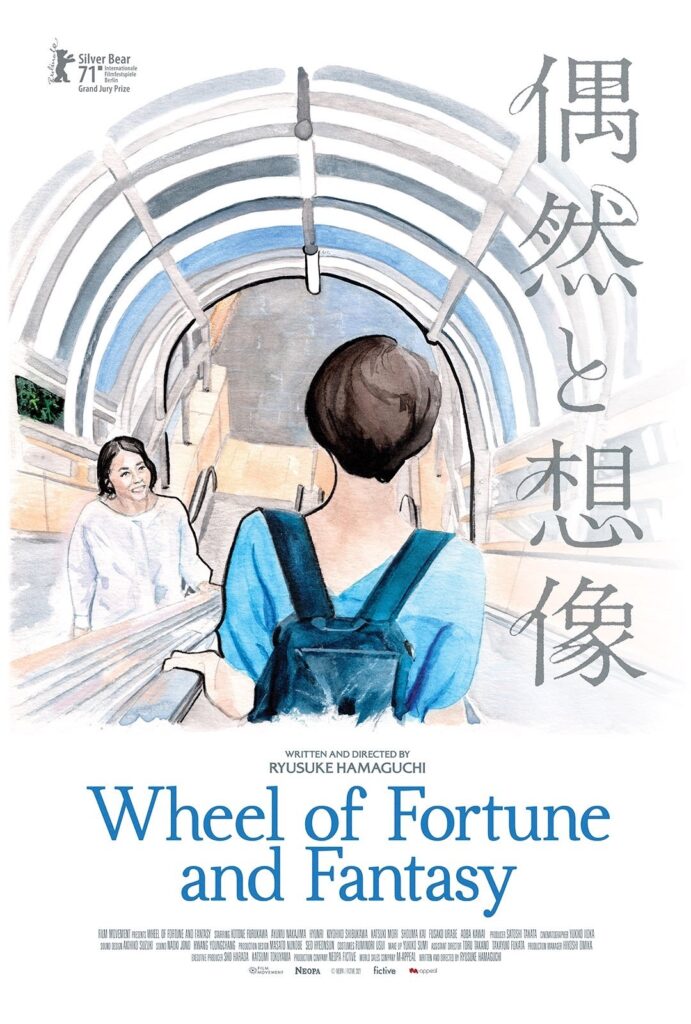A cab ride conversation between two friends ignites a love triangle. A callow young undergraduate sends his older lover to enact revenge on a professor who failed him. A case of mistaken identity allows two women to reimagine their past. In writer/director Ryûske Hamaguchi’s (Drive My Car) exceptional anthology film Wheel of Fortune and Fantasy unlikely coincidences spark deep truths from the characters and carry the weight of regret for things done and unsaid.
Each film, given a title and credits, in the anthology investigates the limits of the stories we tell ourselves to get by in life. Although the films are not connected narratively, there is a deep thematic arch that Hamaguchi handles with both subtlety and aplomb.
The first chapter, Magic (or Something Less Assuring) follows model Meiko (Kotone Furukawa) as she drives home with her best friend and stylist Tsugami (Hyunri). Tsugami relates a magical date with a man called Kaz. She romanticises the connection the two feel over their conversation and relates how she has been caressed by the words they exchanged. Meiko appears happy for her friend but after dropping her off she finds her ex-boyfriend Kazuaki (Ayumu Nakajima) and informs him that Tsu is her best friend. She also begins to regret her actions in the relationship that led to their breakup. Kazuaki is at once furious at Meiko who cheated on him, but clearly also still attracted to her. Moments of clarity that have been evading Meiko come to the surface and she is forced to confront her own infidelity but also where her loyalties lie.
For Meiko her epiphany is painful and fraught, but it becomes even worse when by random chance she and Tsugami meet Kazuaki in a café. A moment played out in her mind becomes too confronting to experience in real life. Her fantasy crumbles.

Meiko isn’t a particularly sympathetic character but the idea that love can be reawakened and re-evaluated is universal. Hamaguchi doesn’t tell the audience who they should be rooting for in this strange triangle but allows the truth of the situation to overcome the fantasy that is playing in Meiko’s mind.
The second chapter, Door Wide Open is perhaps the most frank and difficult of the three pieces. After being failed by his French professor a shallow undergraduate Sasaki (Kai Shôma) decides to send his married mature aged student lover to perform a honey-trap on the now award-winning author Professor Segawa (Kiyohiko Shibukawa). The lover, Nao (Katsuki Mori) takes the professor’s novel to him to be signed. She asks that it be inscribed on the pages of a particularly erotic scene which she then reads to him in the hopes of seducing him.
Both Nao and Segawa discuss their lives, but instead of Nao laying Segawa open to scandal his pertinent and kind observations about her make her reveal the ruse. The metaphor of the open door is made literal as Segawa refuses to close the door of his office. The hidden becomes visible, not just through the act of refusing to enact drama behind closed doors, but through the conversation that illuminates the flaws and humanity of both parties. Paradoxically the open exchange spells the downfall for both Segawa and Nao whose honesty with each other is life changing in multiple ways.
The third, and most affecting chapter, Once Again chronicles an age where the internet due to a virus that leaked all documents has been placed permanently offline. A woman attends her twenty-year school reunion in the hopes of finding her ex-lover. Moka (Fusako Urabe) is a quiet outsider, which may be due to her sexuality, but more likely to her inability to move on from the heartbreak caused by her former lover.
In a case of mistaken identity she meets Nana (Aoba Kawai) on an escalator. Both women recognise each other, and Nana asks Moka home for tea. As the conversation progresses between them they realise that they indeed do not know each other but each reminds them of someone from the past. For Moka it is her ex-lover. Instead of terminating the meeting Nana suggest a role-playing game where she plays Moka’s ex-lover allowing her to express feelings that have been unuttered for twenty-years. In turn Moka plays an old school friend of Nana’s. Both women have a sense of isolation and loneliness that Hamaguchi with delicate warmth allows to be lifted with the act of fantasy. The kindness of strangers is given a poignant vitality as Moka and Nana allow themselves to revisit their past and open themselves up to the young women they once were.
Truth telling is at the heart of Hamaguchi’s film, it could also be argued that it is also at the heart of Drive My Car. There is no reconciliation with our past or present selves if we are unable to strip away the layers of protective untruths or repression we hold to keep afloat. Unlikely scenarios allow characters a chance to better see themselves. Sometimes that clarity is painful, sometimes it is healing. Hamaguchi’s writing and direction are deeply humanistic and give us the sense that in life, although unpredictable, there are moments that can change us that are both small and monumental. It is no small feat to have an anthology film that is cohesive without interconnected narratives – but Hamaguchi’s themes are powerful and although specific to the characters, they are also universal. This universality makes Wheel of Fortune and Fantasy a masterpiece in storytelling and a profoundly accomplished film.
Director: Ryusuke Hamaguchi
Cast: Kotone Furukawa, Kiyohiko Shibukawa, Katuski Mori
Writer: Ryusuke Hamaguchi


